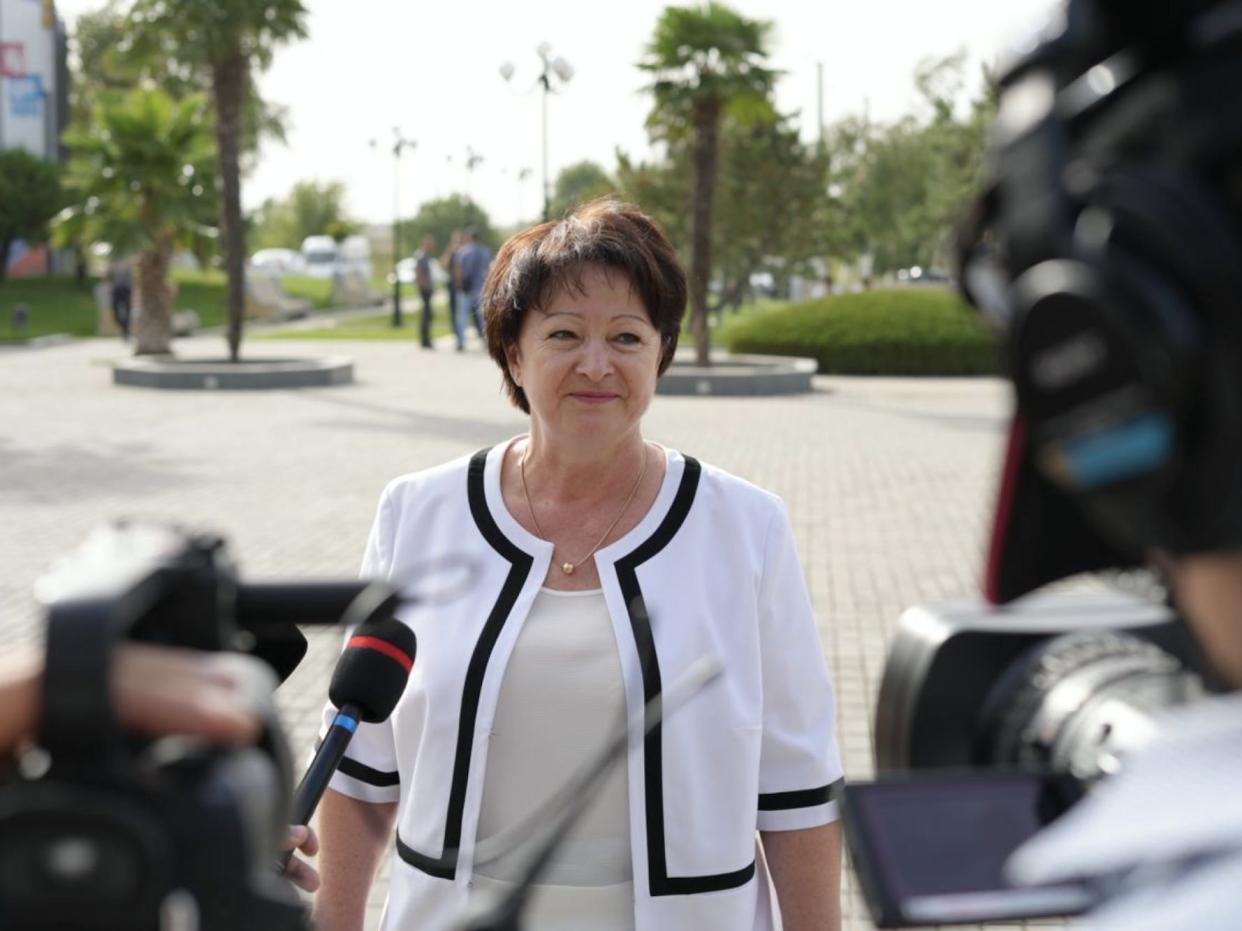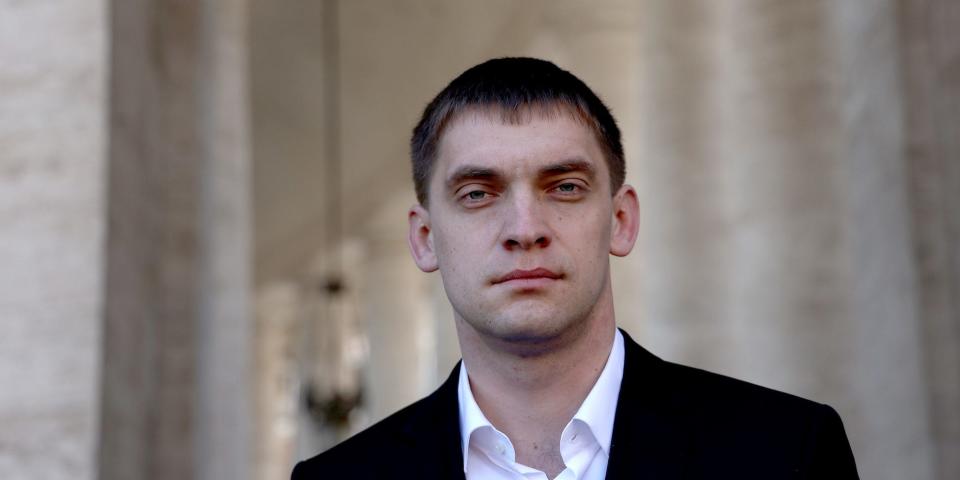Ukrainian collaborators who sided with Russian occupation were given top jobs and fancy titles. Now they're being hunted down.

In occupied parts of Ukraine, some locals decided to side with the Russians.
Unable to get far before the war, they've gained power and as part of the occupation.
But being a collaborator is a dangerous business — and some have a price on their heads.
Galina Danilchenko, the "mayor" of Russian-occupied Melitopol, is trapped.
Around half the city has fled since Russia occupied the city in February, according to its elected mayor, Ivan Fedorov. Melitopol-related Telegram channels are peppered with posts advertising dangerous car rides out of there.
But unlike most Ukrainians living under Russian military rule, Danilchenko's cage is of her own making.
On March 12, Fedorov was snatched off the streets by Russian soldiers, and Danilchenko, a local politician with long-held pro-Russian views, declared herself mayor in his place.
According to RIA-Melitopol, a local news site with strongly partisan leanings, a bomb scare in May prompted her to offer her resignation. But the Russian military administration told her that the only way out is to give herself up to the Ukrainian Secret Service, the outlet reported.
Despite Russia's control of much of the Zaporizhzhia region, it's not a good time to be a collaborator.
While Ukraine's army retakes large swathes of the country in the north-east, partisan fighters in the occupied south are waging guerrilla attacks on anyone who aids Russia — including fellow Ukrainians like Danilchenko.
Since mid-May, at least 11 pro-Russian collaborators have met messy fates — some of them fatal, not all of them formally claimed by Ukraine.
But in August alone, they featured car bombs, a suspected poisoning, and a deputy mayor shot dead just outside his home.
On August 5, both Ukrainian and Russian sources reported that Vladimir Saldo has been put into a medically induced coma, citing a suspected poisoning. Saldo had the head of the government in the occupied city of Kherson.
On August 12, Oleg Shostak— the mouthpiece of Zaporizhzhia's regional military installation— was injured after a bomb went off under his car, per RIA-Melitopol.
The exact injuries are unclear, but Fedorov, the elected mayor, noted with apparent satisfaction that Shostak "will definitely not be able to sit straight on a chair — the part of his body for sitting is literally blown up."
Fedorov told Insider that he is in regular contact with the partisan forces in his city that are working to eliminate collaborators.
And, he said, if the partisans don't get them, Moscow will.

Unable to walk the streets without an armed guard
Fedorov learned that Danilchenko would be installed in his stead when Russian soldiers snatched him on March 11.
"I heard it in the first minutes of my kidnapping," he told Insider. Soldiers told him at gunpoint that he would be freed if he signed papers handing power to Danilchenko, he said.
"I said to them that it's illegal. It's impossible. She can't manage the city," he replied. He signed, but was only freed five days later in a prisoner exchange. Danilchenko has since claimed that Fedorov voluntarily and legally handed her power.
She quickly replaced the city council with her allies and urged Melitopol to adapt to "the new reality." Danilchenko did not respond to multiple requests for an interview.
But, according to her regular propaganda messages, the "new reality" is that of a city willingly integrating into Russia, obstructed by a small group of Ukrainian nationalists who keep attacking city infrastructure. Independent reports speak of beatings, thefts, and dwindling food supplies.
Fedorov said he has since worked to help his citizens, without access to the workings of the city.
He maintains that Danilchenko is purely a figurehead, a Ukrainian face for a foreign occupation. She has the distinction of being the first person sanctioned by the West for collaboration, first by the UK and then the US. She has been accused of treason by Zelenskyy's government.
"You need to understand she doesn't walk on the street," he said. "It's impossible. She goes with security. Security brings her somewhere. She makes a speech, and they bring her home. That's all."
A mogul's puppet
Danilchenko is regarded by the Ukrainian Security Service as no more than a puppet of Balitsky and the Kremlin.
Prior to the war, she was an accountant and director of a tractor-part factory, the Melitopol Plain Bearing Plant.
The business was owned by Balitsky and formerly had many Russian and Belarusian contracts, according to the BBC's Russian service. But this vanished after Russia's 2014 annexation of Crimea, she later told the state-run RT news network.
Later, Balitsky's factory was embroiled in a long-running fraud scandal, in which the company misspent a $2.2 million state loan, according to RIA Melitopol. It is unclear what role, if any, Danilchenko had in that.
Both went into politics with the pro-Russian Opposition Bloc, which won some administrative positions but was not truly close to power.
From there, she was an obvious candidate when Russia took the city by force.
'A massive gamble'
There is no universally agreed definition of a collaborator, but the word describes a range of behaviors and motivations — from a genuine belief in the occupier's cause to acting on a simple survival instinct.
More than 1,300 people are under investigation for aiding the Russians in Ukraine, according to Ihor Klymenko, Ukraine's Head of National Police.
Fedorov told Insider that, under Ukrainian law, the label does not apply to people who, in an occupied city, are working under Russians to keep municipal services running.
It's those who take official positions that directly legitimate the occupier, who are collaborators, he said.
"These are people who can't make any career in Ukraine," he said. "Now they want to be a collaborator and to show their power with Russian support."
Dr Andi Hoxhaj, a specialist in corruption and EU law at the UK's University of Warwick, agreed that the typical collaborator is often someone who couldn't get ahead without the help of an occupying army.
When an invader comes, they make a calculation that advancing the interests of the invaders may well advance their own, he said.
"They know that they're in trouble, right," said Hoxhaj. "They know that they've been engaging in corruption, and they know that they've broken the law over and over again, and they could see the trajectory of where they're going."
So when something like Russian occupation comes along, "it's a no-brainer," he said.
John Hickman, professor of international affairs at Berry College in Georgia, told Insider that the smoother a collaborator can make an occupation the more valuable they are.
But they inspire fierce revulsion — especially when occupied people resist.
"Collaborators who are on a losing side end up being blamed even more than perhaps more important decision makers," Hickman said.
Hoxhaj also called it a "massive gamble" because of the grim fate that awaits then if their side loses.
In that position, there's no choice but to succeed.
Gunmen in the bushes
On Tuesday, pro-Russian officials in four occupied regions of Ukraine announced coming referendums on joining Russia — including in Melitopol's wider Zaporizhzhia region.
Such votes are considered a sham by Ukraine and the international community but can provide Russia with at least a claimed form of legitimacy, and they have been fiercely resisted in Melitopol.
An earlier attempt to organize a referendum in Melitopol was postponed after three collaborators who promoted it were attacked. And others are taking note.
Collaborators who were previously happily photographed in their media calls now have their faces "carefully blurred," according to Vitaly Gorbenko, a Melitopol-born journalist in exile who is the spokesperson for Evocation, a project registering accused collaborators.
Another accused collaborator, Andrey Khrushch, cut down all the trees outside his office after Shostak, the propagandist, was hurt by the August 12 car bomb, according to local media.
The word in Melitopol is that the trees came down "so that nobody can hide and shoot him from there," Svetlana Zalizetskaya, a Melitopol journalist who has fled the city, told Insider.
Evvgeny Balitsky, the installed head of the Zaporizhzhia military administration, also increased his personal security, according to Evocation.
In May, signs went up across the city with a picture of Danilchenko, a target superimposed on her head, according to RIA Melitopol. They offered $100 for her location, $699 if she was killed, and $300 if she was merely mutilated, the outlet said.
Fedorov, who estimates more than 90% of his citizens oppose the Russians, appears certain about her fate.
'Of course she will be killed'
Fedorov is clear that he wants Danilchenko to face formal justice in a court of law. But he believes a violent end is just as likely.
And that could be meted out equally by from Russian occupiers as by Ukrainians.
"She will be killed," he said. "Either by the Russian secret services — they will clean this position because she knows many things — or from hands of our partisans. Of course she will be killed."
On Sunday, footage of a large explosion in the city center began to circulate. Danilchenko quickly said that the footage was faked.
But Fedorov attributed it to an assassination attempt on Denys Stefankov, who has been installed in the capacity of chief of police. Fedorov had named him a traitor and said partisans were preparing to seize his possessions.
But, he said, the people who tried to kill Stefankov down weren't Ukrainians, but Russians.
Insider was unable to verify either claim.
Federov wrote in a Telegram post: "It should be clear to everyone who betrayed Ukraine: the Russians do not need you. Once you are used, you become expendable."
Editor's note: an earlier version of this story described Serhii Haidai as a collaborator who had been killed. Haidai is in fact a Ukrainian official who announced an unnamed collaborator's death.
Read the original article on Business Insider


